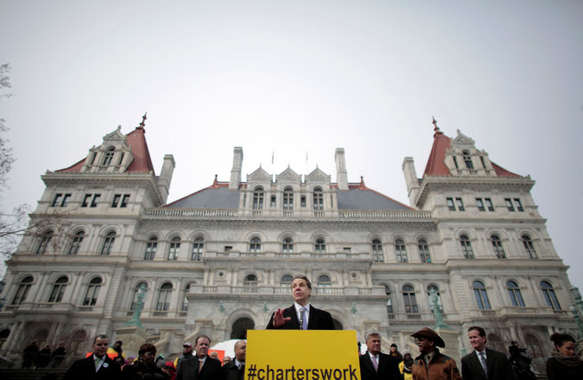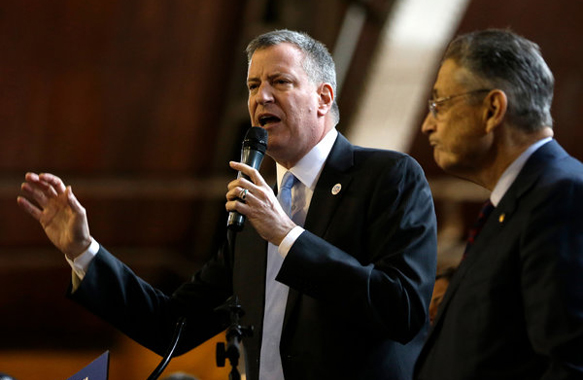Gov. Andrew M. Cuomo spoke at a rally in support of charter schools on the steps outside the State Capitol in Albany last month. | Credit Nathaniel Brooks for The New York Times
By Javier C. Hernández and Susanne Craig | Originally Published at The New York Times. April 3, 2014 It was a frigid February day in Albany, and leaders of New York City’s charter school movement were anxious. They had gone to the capital to court lawmakers, but despite a boisterous showing by parents, there seemed to be little clarity about the future of their schools. Then, as they were preparing to head home, an intermediary called with a message: Gov. Andrew M. Cuomo wanted to meet. To their surprise, Mr. Cuomo offered them 45 minutes of his time, in a private conference room. He told them he shared their concern about Mayor Bill de Blasio’s ambivalence toward charter schools and offered to help, according to a person who attended but did not want to be identified as having compromised the privacy of the meeting. In the days that followed, the governor’s interest seemed to intensify. He instructed charter advocates to organize a large rally in Albany, the person said. The advocates delivered, bringing thousands of parents and students, many of them black, Hispanic, and from low-income communities, to the capital in early March, and eclipsing a pivotal rally for Mr. de Blasio taking place at virtually the same time. The moment proved to be a turning point, laying the groundwork for a deal reached last weekend that gave New York City charter schools some of the most sweeping protections in the nation, including a right to space inside public buildings. And interviews with state and city officials as well as education leaders make it clear that far from being a mere cheerleader, the governor was a potent force at every turn, seizing on missteps by the mayor, a fellow Democrat, and driving legislation from start to finish. Mr. Cuomo’s office declined on Wednesday to comment on his role. As the governor worked to solidify support in Albany, his efforts were amplified by an aggressive public relations and lobbying effort financed by a group of charter school backers from the worlds of hedge funds and Wall Street, some of whom have also poured substantial sums into Mr. Cuomo’s campaign (he is up for re-election this fall). The push included a campaign-style advertising blitz that cost more than $5 million and attacked Mr. de Blasio for denying space to three charter schools. Charter school leaders had built a formidable political operation over the course of a decade, hiring top-flight lobbyists and consultants. They had an ally in former Mayor Michael R. Bloomberg, but Mr. de Blasio promised a sea change, saying that he would charge rent to charter schools that had large financial backing, and that he would temporarily forbid new schools from using public space. In public, the mayor largely ignored the outcry. At his prekindergarten rally, before a smaller crowd at the Washington Avenue Armory in Albany, Mr. de Blasio spoke about the value of early education. Not far away, a much larger crowd of charter school supporters was gathered on the steps of the State Capitol. In an act that his aides later said was spontaneous, Mr. Cuomo joined the mass of parents and students. “You are not alone,” he told the roaring crowd. “We will save charter schools.” The move to protect charter schools had begun months before, when it became clear that Mr. de Blasio was favored to win the mayoral race. Charter school leaders were in a panic; a memo circulated over the summer by one pro-charter group, Democrats for Education Reform, had identified Mr. de Blasio as the candidate least friendly to their cause. Charter schools — privately run, but with taxpayers paying the tuition — have become popular nationwide among Democratic and Republican leaders, as well as with tens of thousands of low-income parents who submit to kindergarten lotteries every year. They are also popular among Wall Street leaders who see charter schools, which often do not have unions to bargain with and have relative freedom from regulation, as a successful alternative to traditional public schools. But many Democrats, including the mayor, have sought to slow their spread, contending that they are taking dollars and space from other public schools. Pro-charter advocacy groups, including Families for Excellent Schools, StudentsFirstNY and the New York City Charter School Center, met regularly to plot strategy. Increasingly, they turned to state officials. A lot was riding on the debate for Mr. Cuomo. A number of his largest financial backers, some of the biggest names on Wall Street, also happened to be staunch supporters of charter schools. According to campaign finance records, Mr. Cuomo’s re-election campaign has received hundreds of thousands of dollars from charter school supporters, including William A. Ackman, Carl C. Icahn, Bruce Kovner and Daniel Nir. Kenneth G. Langone, a founder of Home Depot who sits on a prominent charter school board, gave $50,000 to Mr. Cuomo’s campaign last year. He said that when the governor asked him to lead a group of Republicans supporting his re-election, he agreed because of Mr. Cuomo’s support for charter schools. “Every time I am with the governor, I talk to him about charter schools,” Mr. Langone said in an interview. “He gets it.” It was not until late February, shortly before the rally on the steps of the Capitol, that a full-fledged battle broke out. Mr. de Blasio, reviewing plans for school space, had decided to deny it to three schools run by Success Academy Charter Schools, a high-performing network founded by Eva S. Moskowitz, a former city councilwoman. While he allowed the vast majority of charter schools to continue using public space, many supporters of Ms. Moskowitz’s schools were outraged. Daniel S. Loeb, the founder of the hedge fund Third Point and the chairman of Success Academy’s board, began leaning on Wall Street executives for donations. Later this month, he will host a fund-raiser for Success Academy at Cipriani in Midtown Manhattan; tickets run as high as $100,000 a table. The governor and his staff worked with Republicans in the State Senate and others to come up with a package of protections for charter schools in the city. He was already said to be displeased with Mr. de Blasio for rejecting his compromise offer on prekindergarten funding. Mr. Cuomo did not mention charter schools in his State of the State address, but now, with Mr. de Blasio under assault and charter advocates behind him, he pushed for a sweeping deal. The proposed legislation included provisions to reverse Mr. de Blasio’s decisions on school space, and it required the city to provide public classrooms to new and expanding charter schools or contribute to the cost of renting private buildings. It also suggested increasing per-pupil funding for charter schools and allowing them to operate prekindergarten programs. At the same time, Mr. de Blasio was struggling to move beyond the controversy. He began reaching out to supporters of charter schools on Wall Street. And at the urging of Hillary Rodham Clinton, former President Bill Clinton phoned Mr. de Blasio to offer his advice. In Albany, the forces that typically mobilized against charter schools were unusually subdued. The teachers’ unions and Sheldon Silver, the State Assembly speaker, were focused on winning more school aid, and Mr. de Blasio was in the midst of recalibrating his message, leaving little incentive for charter opponents to speak out. “There simply were not a lot of people against the charters,” said Karim Camara, a Democratic assemblyman from Brooklyn and supporter of charter schools, who introduced Mr. Cuomo at the rally in early March. In the final hours of negotiations, Mr. Cuomo successfully got the protections he was seeking, giving additional money to other schools to seal the deal. “Nobody said being mayor of New York is easy,” the governor said on Monday as he announced details of the budget. “Nobody said being governor of New York is easy. And it is not easy. But it’s all’s well that ends well.” A day later, the advocacy group that had run the ads against Mr. de Blasio released a new one. “Parents from Brooklyn to the Bronx had a cause, and they had a voice,” it declared. “They just needed some champions.” A photo of Mr. Cuomo, smiling and holding his fist high in the air, appeared on screen. The same picture is displayed on the governor’s campaign website. Al Baker, Amy Chozick and Alexandra Stevenson contributed reporting, and Jack Begg contributed research. A version of this article appears in print on April 3, 2014, on page A1 of the New York edition with the headline: For Cuomo, Pivotal Role in Charter School Push.













Leave A Comment